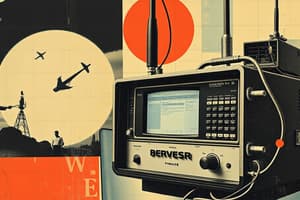Podcast
Questions and Answers
What component is responsible for validating the mobile equipment separately with IMEI and EIR?
What component is responsible for validating the mobile equipment separately with IMEI and EIR?
- IMEI
- SIM (correct)
- EIR
- RAM
Which function is NOT performed by the Mobile Station?
Which function is NOT performed by the Mobile Station?
- Speech encoding/decoding
- Mobility management (correct)
- Rate adaptation of user data to the radio link
- Radio transmission and reception
Which mode is commonly used for 3G networks?
Which mode is commonly used for 3G networks?
- FDD (correct)
- TDMA
- TDD
- FDMA
What is the minimum spectrum allocation required for W-CDMA?
What is the minimum spectrum allocation required for W-CDMA?
In TD-SDMA, how is interference between neighboring base stations avoided?
In TD-SDMA, how is interference between neighboring base stations avoided?
What is the main responsibility of a Base Transceiver Station (BTS) according to the text?
What is the main responsibility of a Base Transceiver Station (BTS) according to the text?
Which parameter is NOT used to differentiate between Base Transceiver Stations (BTSs) as per the text?
Which parameter is NOT used to differentiate between Base Transceiver Stations (BTSs) as per the text?
What is the primary role of the Base Station Controller (BSC) mentioned in the text?
What is the primary role of the Base Station Controller (BSC) mentioned in the text?
How many RF carriers can each Base Transceiver Station (BTS) typically support according to the information provided?
How many RF carriers can each Base Transceiver Station (BTS) typically support according to the information provided?
What does the Base Transceiver Station (BTS) NOT do as part of its functions according to the text?
What does the Base Transceiver Station (BTS) NOT do as part of its functions according to the text?
Flashcards
SIM Validation
SIM Validation
The SIM card validates mobile equipment using IMEI and EIR.
Mobile Station's Role
Mobile Station's Role
A mobile phone handles communication but not mobility management.
3G Network Mode
3G Network Mode
Frequency Division Duplexing (FDD) is a common 3G mode.
W-CDMA Spectrum
W-CDMA Spectrum
Signup and view all the flashcards
TD-SDMA Interference
TD-SDMA Interference
Signup and view all the flashcards
BTS Transmission
BTS Transmission
Signup and view all the flashcards
BTS Differentiation
BTS Differentiation
Signup and view all the flashcards
BSC Role
BSC Role
Signup and view all the flashcards
BTS RF Carriers
BTS RF Carriers
Signup and view all the flashcards
BTS Resource Management
BTS Resource Management
Signup and view all the flashcards
Study Notes
Network Components and Functions
- The Equipment Identity Register (EIR) is responsible for validating mobile equipment separately with IMEI.
Mobile Station Functions
- The Mobile Station does not perform authentication functions.
3G Networks
- Wideband Code Division Multiple Access (W-CDMA) is commonly used for 3G networks.
- The minimum spectrum allocation required for W-CDMA is 5 MHz.
TD-SDMA Technology
- In TD-SDMA, interference between neighboring base stations is avoided through synchronization of transmission timing.
Base Transceiver Station (BTS) Functions
- The primary responsibility of a Base Transceiver Station (BTS) is to provide radio coverage and transmit and receive radio signals.
- A BTS does not perform authentication functions.
- Each BTS can typically support 1-3 RF carriers.
Base Station Controller (BSC) Functions
- The primary role of the Base Station Controller (BSC) is to control multiple BTSs.
BTS Identification
- The Cell Identity (CI) parameter is used to differentiate between Base Transceiver Stations (BTSs).
Studying That Suits You
Use AI to generate personalized quizzes and flashcards to suit your learning preferences.




